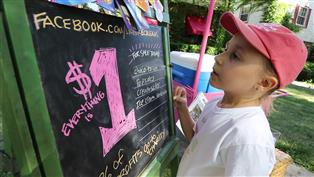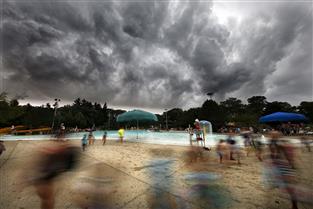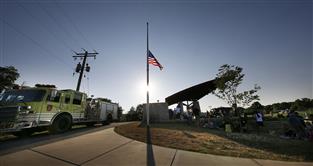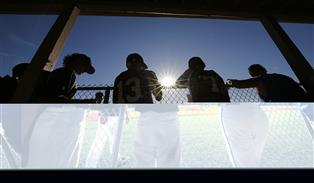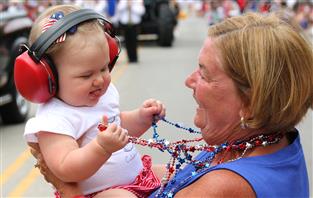Wauwatosa officials are open to the idea of allowing beekeeping on residential properties.
The Community Development Committee last week discussed the issue at the request of Alderman Bobby Pantuso, who brought it forward on behalf of a constituent.
Assistant City Attorney Eileen Miller-Carter told the committee in a memo that except for on the Milwaukee County grounds, beekeeping is currently not allowed in Wauwatosa. Nor is it allowed in many neighboring suburbs, including Brookfield, New Berlin, West Allis, Greenfield and Shorewood.
Precedent exists
Wisconsin communities that do allow beekeeping, according to the memo, include Milwaukee, Pewaukee, Madison and Green Bay.
Milwaukee's ordinance allows up to two colonies per owner on private property, provided the resident can offer proof of beekeeping competence and a single map of the apiary and surrounding area, in addition to obtaining a beekeeping/apiary permit through the city.
If the committee would be in favor of permitting it, Miller-Carter's recommendation would be to establish regulations governing the location of the apiary, or bee colony, and manner of beekeeping to protect the health and safety of the community and nearby neighbors and reduce the risk of bees traveling away from the hives.
Public benefit or hazard?
As it pertains to the overall health of the community, Public Health Manager James Beix explained in a separate memo that allowing honeybees to be kept on residential-zoned properties would potentially introduce more allergens into the community and increase the risk of exposure to all residents, including those with allergies to bee stings, which applies to "a small but appreciable number of Wauwatosa residents."
Wauwatosa beekeeper Mykl Dettlaff, whose hives prompted the city to examine the issue, was unable to attend the meeting but submitted to the committee an email supporting his cause.
"Besides there being a worldwide movement to promote beekeeping, our cities and their beekeepers would provide an enclave for the bees that are declining in other areas," Dettlaff stated in the email, which was read to the committee by resident Jane Mortazavi. "Every city-dweller that appreciates nature should want to have pollinators service the gardens and flowering trees and shrubs that make our city beautiful and livable."
He described beekeepers as an asset to the community, listing Washington, D.C., London and Paris as major cities that not only allow beekeeping, but have thriving apiaries in backyards and on rooftops. In terms of beekeeping being a liability, Dettlaff noted in his letter that most bee stings can be attributed to hornets or wasps, not honeybees.
"I generally don't worry about putting bees in somebody's backyard, even a little city lot, and having them bother the neighbors," agreed experienced beekeeper Andy Hemken of Big Bend. "Pretty much if you don't see the hive, you'll never know the bees are there."
Fellow beekeeper Brett Perry also voiced support for the hobby, urging committee members to consider giving Wauwatosa residents the freedom to have that opportunity.
Considering the issue in a social context, in light of declining honeybee populations, aldermen were clearly intrigued by the idea of beekeeping and interested in learning more about the possibility of allowing it in the city.
As a city resident who happens to be highly allergic to bees, District 4 Alderman Dennis McBride said the committee ought to examine the issue with care out of consideration to those who may be uncomfortable with having bees in close proximity to their homes. However, the idea does not bother him.
"I supported the chicken ordinance, but I think that there are greater social benefits with bees," McBride later added, noting the role of bees in local agriculture. "There's a societal benefit to this that goes far beyond keeping a chicken or two, I think."
More consideration
District 7 Alderwoman Cheryl Berdan agreed that she would consider a commonsense ordinance that would protect surrounding neighbors.
Hemken said he has assisted with the development of beekeeping ordinances in Milwaukee, Port Washington and the town of Lisbon. Should Wauwatosa choose to proceed with its own ordinance, Hemken's advice to the committee was to keep it simple.
Pantuso suggested the item be tabled until the committee's next meeting to allow for further research and discussion, which the committee supported.
NEXT STEP
WHAT: Community Development Committee to further discuss allowing beekeeping in Wauwatosa
WHEN: April 29, time to be announced
WHERE: City Hall, 7725 W. North Ave.
More from News and Features
- Anodyne Coffee plans to open location in Wauwatosa Village
- Wauwatosa Meetings: Aug. 4
- Video: Wauwatosa girl's curbside ice cream stand raises money for the hungry
- Wauwatosa News and Notes: Hands-only CPR training offered; Firefly Art Fair is Aug. 6-7
- Wauwatosa Ask Now: Why are there barriers and fencing along the North Avenue bridges over the Menomonee River?
- Mystery Photo Contest: July 28
- Wauwatosa gears up for National Night Out event, this year at the zoo
- Election 2016: Wisconsin's 4th District candidates weigh in
- Wauwatosa's Luther Manor residents share smiles through flower delivery
- Wauwatosa Police Report: July 17-23






